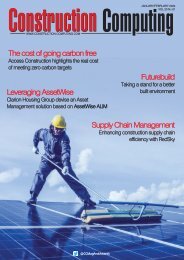DM1907
Create successful ePaper yourself
Turn your PDF publications into a flip-book with our unique Google optimized e-Paper software.
STRATEGY: SECURITY Dm<br />
"DESPITE THE GROWING POPULARITY OF PAPERLESS OFFICES, MANY<br />
BUSINESSES STILL RELY ON PAPER RECORDS. INDUSTRIES SUCH AS LAW,<br />
FINANCE, AND REAL ESTATE STILL DEPEND ON PHYSICAL DOCUMENTS IN<br />
THEIR DAY-TO-DAY OPERATIONS. EVEN WITH A STRINGENT STORAGE<br />
SYSTEM IN PLACE, THESE DOCUMENTS ARE STILL AT RISK OF THEFT WHEN<br />
KEPT IN THE WORKPLACE."<br />
THE RISK TO SMALL BUSINESS<br />
Hackers don't just go after big<br />
corporations. Research suggests small<br />
and medium-sized enterprises (SMEs)<br />
are even more vulnerable to cyberattacks.<br />
A study in 2016 by the<br />
Federation of Small Businesses found<br />
that around two-thirds of SMEs have<br />
been targeted by cybercriminals.<br />
According to a survey conducted by<br />
professional indemnity insurance<br />
brokers PolicyBee, one-third of small<br />
businesses believe a cyber-attack is a<br />
matter of 'when' not 'if', but 43% of<br />
SMEs have no plan in place to deal<br />
with cybercrime.<br />
"A single SME might not make a<br />
criminal rich but they are easier to<br />
attack because they spend less money<br />
on security and training," said Duncan<br />
Sutcliffe, director of Sutcliffe & Co<br />
Insurance Brokers. "Criminals will<br />
prefer to target numerous easy SMEs<br />
rather than one difficult large<br />
organisation."<br />
SMEs are particularly exposed to<br />
'phishing' attacks - where hackers send<br />
emails posing as trustworthy sources<br />
and ask for sensitive information - and<br />
the 'hack attack'. This is when a hacker<br />
exploits an unpatched software<br />
vulnerability to access a company's<br />
network and steal its data.<br />
Further, almost a quarter of SMEs still<br />
manage their finances solely on paper.<br />
No amount of staff training and<br />
workplace policies can predict a simple<br />
mishap such as accidentally shredding<br />
or misplacing a document.<br />
"Old-fashioned security like locked<br />
cabinets, locked doors, locked<br />
windows, intruder alarms and<br />
procedures for transporting documents<br />
safely are the best ways to ensure<br />
paper documents don't get into the<br />
wrong hands," says Sutcliffe.<br />
However, for SMEs with limited<br />
budgets, this may prove to be an<br />
expensive investment. Choices will<br />
have to be made to get the best and<br />
most economical option for document<br />
safety. If businesses don't have the<br />
budget or time to set up an online<br />
security system to avoid the risks of<br />
online fraud, they may need to<br />
consider keeping only paper versions<br />
of files in a safe space, until their<br />
situation changes.<br />
STAY ONE STEP AHEAD<br />
It's important for businesses to be<br />
vigilant and keep up with the latest<br />
cybercrime techniques. An example is<br />
'drive-by' downloading. This occurs<br />
when someone is tricked into<br />
downloading malware onto their<br />
device, granting hackers access to their<br />
data. "It's impossible to be 100% safe<br />
but you can mitigate most common<br />
threats by taking some simple<br />
technical measures. Every small<br />
improvement you make reduces the<br />
risks to your business," said Duncan<br />
Sutcliffe.<br />
The National Cyber Security Centre<br />
recommends a number of technical<br />
measures for cyber-security. These<br />
include:<br />
Securing internet connection by<br />
installing a firewall<br />
Choosing appropriate security<br />
settings on devices and software,<br />
such as passwords and 'two-factor'<br />
authentication to certain accounts<br />
Monitoring who has access to data<br />
and services, such as administrative<br />
accounts and extra permissions<br />
Installing software to protect against<br />
malware such as viruses and<br />
ransomware<br />
Updating devices, operating systems,<br />
apps and software, also known as<br />
'patching'<br />
But information isn't just stolen online.<br />
Paper documents are just as attractive to<br />
thieves when they haven't been correctly<br />
shredded or destroyed. "There's an<br />
expression called 'dumpster diving',<br />
which is where criminals go through bins<br />
to find valuable information," added<br />
Duncan Sutcliffe.<br />
Going paperless can free up a lot of<br />
space in the office. But it can also put<br />
businesses in a more vulnerable position<br />
when it comes to data theft and fraud if<br />
the necessary security measures and staff<br />
training aren't taken seriously. Using an<br />
off-site archiving facility to store<br />
important legal and financial documents<br />
can clear space as well as protect a<br />
business from malicious attacks.<br />
More info: www.russellrichardson.co.uk<br />
www.document-manager.com<br />
July/August 2019<br />
@DMMagAndAwards<br />
31

















